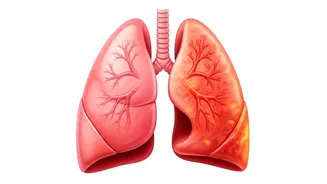Sugary Drinks And Your Lungs
Sugary drinks are often associated with weight gain and dental problems, but their impact extends to lung health. Excessive consumption of sugary beverages
can contribute to inflammation throughout the body, including the lungs. This inflammation can make it more difficult for the lungs to function properly and may increase the risk of respiratory issues. Consider that the high sugar content can also indirectly affect lung health by promoting weight gain, which can put extra pressure on the lungs, making breathing harder. To support healthy lungs, it is advisable to limit sugary drinks and opt for water, herbal teas, or other healthier alternatives. Making mindful choices can make a significant difference in respiratory well-being.
Processed Meats And Breathing
Processed meats, which are frequently part of everyday meals, pose a hidden threat to respiratory health. These products often contain high levels of nitrates and nitrites, which are used as preservatives. When consumed, these compounds can trigger inflammation in the airways, making breathing difficult. Moreover, processed meats are typically high in saturated fats, contributing to overall health issues that indirectly affect the lungs. The presence of these additives and the overall nutritional profile of processed meats make them a less-than-ideal choice for those seeking to maintain healthy lungs. Choosing fresh, unprocessed meats or plant-based protein sources is a better way to support respiratory health.
Salty Foods And Lungs
The consumption of excessive salt can have a detrimental effect on the lungs. High sodium intake can lead to fluid retention throughout the body, including in the lungs. This fluid accumulation can make breathing more challenging, as it interferes with the normal function of the lungs. Moreover, a diet rich in sodium can contribute to high blood pressure, which, in turn, may increase the risk of respiratory problems. While salt is essential in small amounts, it’s crucial to moderate intake, particularly for those concerned about their respiratory health. Reading food labels and opting for low-sodium alternatives can significantly improve lung function and overall well-being.
Dairy Products And Airways
Dairy products, while a staple in many diets, can sometimes exacerbate respiratory issues. Some individuals experience an increased production of mucus when consuming dairy. This excess mucus can clog the airways, leading to breathing difficulties and increasing the risk of respiratory infections. It is important to note that the impact of dairy varies from person to person; some might be more sensitive than others. People with existing respiratory conditions might find that reducing dairy consumption alleviates some symptoms. Experimenting with dairy alternatives, like almond or soy milk, can reveal a more comfortable and supportive dietary approach for maintaining healthy lungs.
Fried Foods And Airways
Consuming fried foods can negatively impact lung function due to their high fat content and the way they are cooked. The process of frying often involves the absorption of unhealthy fats, which can lead to inflammation and increase the risk of respiratory complications. These foods tend to be heavy and hard to digest, which can indirectly affect the lungs by putting extra strain on the body. Furthermore, the oil used in frying can sometimes release harmful compounds when heated, further irritating the airways. Replacing fried foods with healthier cooking methods, such as baking, steaming, or grilling, can greatly improve respiratory health.
Refined Grains And Lungs
Refined grains, often found in white bread, pasta, and pastries, are another category of foods that can compromise lung health. These grains are typically stripped of their fiber and nutrients, leading to rapid spikes in blood sugar levels. This can trigger an inflammatory response in the body, which can extend to the lungs. Inflammation can make breathing harder and potentially worsen respiratory conditions. Consuming refined grains offers little nutritional value, whereas whole grains, which are richer in fiber and nutrients, contribute to overall well-being. Choosing whole grains can play a beneficial role in maintaining healthy lungs.
Artificial Sweeteners And Lungs
Artificial sweeteners, often found in diet foods and drinks, pose an unanticipated threat to respiratory health. Some artificial sweeteners, like aspartame, have been linked to an increased risk of respiratory issues in some individuals. These sweeteners can trigger allergic reactions or other sensitivities, leading to inflammation and breathing difficulties. Moreover, the long-term effects of artificial sweeteners on lung health are not yet fully understood. To support healthy lungs, it is generally best to limit or avoid artificial sweeteners and opt for natural, less processed alternatives. Prioritizing a natural diet ensures better respiratory function.















